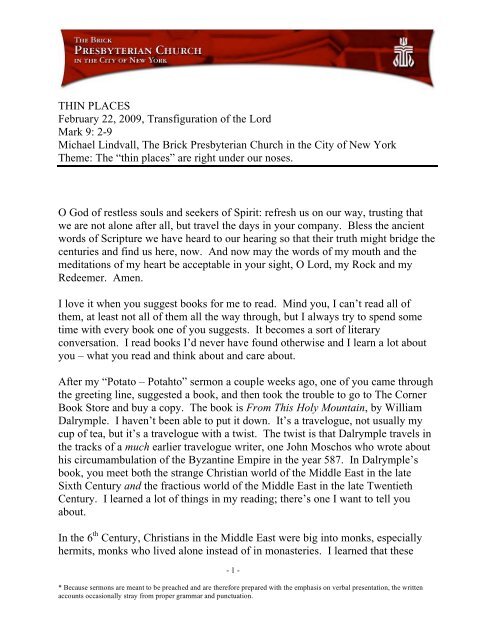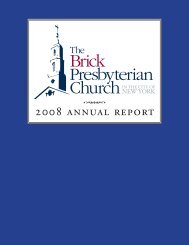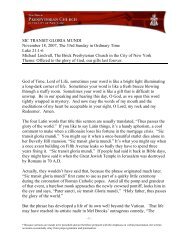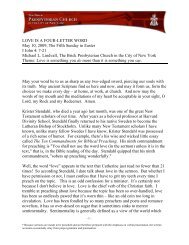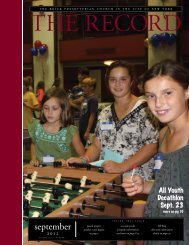THIN PLACES February 22, 2009, Transfiguration of ... - Brick Church
THIN PLACES February 22, 2009, Transfiguration of ... - Brick Church
THIN PLACES February 22, 2009, Transfiguration of ... - Brick Church
- No tags were found...
Create successful ePaper yourself
Turn your PDF publications into a flip-book with our unique Google optimized e-Paper software.
<strong>THIN</strong> <strong>PLACES</strong><br />
<strong>February</strong> <strong>22</strong>, <strong>2009</strong>, <strong>Transfiguration</strong> <strong>of</strong> the Lord<br />
Mark 9: 2-9<br />
Michael Lindvall, The <strong>Brick</strong> Presbyterian <strong>Church</strong> in the City <strong>of</strong> New York<br />
Theme: The “thin places” are right under our noses.<br />
O God <strong>of</strong> restless souls and seekers <strong>of</strong> Spirit: refresh us on our way, trusting that<br />
we are not alone after all, but travel the days in your company. Bless the ancient<br />
words <strong>of</strong> Scripture we have heard to our hearing so that their truth might bridge the<br />
centuries and find us here, now. And now may the words <strong>of</strong> my mouth and the<br />
meditations <strong>of</strong> my heart be acceptable in your sight, O Lord, my Rock and my<br />
Redeemer. Amen.<br />
I love it when you suggest books for me to read. Mind you, I can’t read all <strong>of</strong><br />
them, at least not all <strong>of</strong> them all the way through, but I always try to spend some<br />
time with every book one <strong>of</strong> you suggests. It becomes a sort <strong>of</strong> literary<br />
conversation. I read books I’d never have found otherwise and I learn a lot about<br />
you – what you read and think about and care about.<br />
After my “Potato – Potahto” sermon a couple weeks ago, one <strong>of</strong> you came through<br />
the greeting line, suggested a book, and then took the trouble to go to The Corner<br />
Book Store and buy a copy. The book is From This Holy Mountain, by William<br />
Dalrymple. I haven’t been able to put it down. It’s a travelogue, not usually my<br />
cup <strong>of</strong> tea, but it’s a travelogue with a twist. The twist is that Dalrymple travels in<br />
the tracks <strong>of</strong> a much earlier travelogue writer, one John Moschos who wrote about<br />
his circumambulation <strong>of</strong> the Byzantine Empire in the year 587. In Dalrymple’s<br />
book, you meet both the strange Christian world <strong>of</strong> the Middle East in the late<br />
Sixth Century and the fractious world <strong>of</strong> the Middle East in the late Twentieth<br />
Century. I learned a lot <strong>of</strong> things in my reading; there’s one I want to tell you<br />
about.<br />
In the 6 th Century, Christians in the Middle East were big into monks, especially<br />
hermits, monks who lived alone instead <strong>of</strong> in monasteries. I learned that these<br />
- 1 -<br />
* Because sermons are meant to be preached and are therefore prepared with the emphasis on verbal presentation, the written<br />
accounts occasionally stray from proper grammar and punctuation.
Byzantine hermit monks voluntarily imposed all variety <strong>of</strong> bizarre physical<br />
disciplines on themselves in their quest to become close to God in a deeply<br />
mystically sense. Some <strong>of</strong> them spent years in tiny cells. One hermit decided that<br />
he would spend his life standing up.<br />
One <strong>of</strong> the most popular <strong>of</strong> these radical privations was for the hermit to live on a<br />
little platform on top <strong>of</strong> a pillar. These l<strong>of</strong>ty hermits – they were twenty, forty,<br />
sixty feet up in-the-air – were called “stylites” after the Greek word for pillar.<br />
They almost never came down from their perches. People brought them food and<br />
clothes, but more importantly, people came to these air-borne spiritual athletes for<br />
advice, for “counseling” we would call it. People came to hear stylites preach<br />
sermons and to hear them <strong>of</strong>fer spiritual commentary on politics, current events,<br />
and the moral state <strong>of</strong> affairs. Stylites were understood to be human windows into<br />
the divine. They were mortal connections to God. They were mystics who linked<br />
our world to the reality beyond our world.<br />
Stylites even became oddly fashionable. Every city and village in the Byzantine<br />
world wanted its own local stylite. Just like modern municipalities lure companies<br />
with tax abatements, Byzantine towns tried to lure stylites. They were doubtless<br />
good for the tourist trade, but it was more than that. They were windows into<br />
heaven, connections to the eternal – right here in our grimy little corner <strong>of</strong> Anatolia<br />
or Syria.<br />
- 2 -<br />
+++<br />
In a far distant corner <strong>of</strong> the Christian world, in the Celtic reaches <strong>of</strong> northwestern<br />
Europe, Ireland and Scotland especially, they still talk about what they call “the<br />
thin places.” These are places, not people, but geographical places where the<br />
scrim separating the temporal for the eternal, the human from the divine, is<br />
somehow thinner. There is a Celtic mantra to the effect that heaven and earth are<br />
only three feet apart, but in the thin places, it’s even closer.<br />
Perhaps the most famous <strong>of</strong> the Celtic thin places is the tiny island <strong>of</strong> Iona in the<br />
Scotland’s Inner Hebrides. It was to Iona that the Irish monk, St. Columba, came<br />
in 563, just five years after John Moschos hiked the Byzantine world <strong>of</strong> stylites. It<br />
* Because sermons are meant to be preached and are therefore prepared with the emphasis on verbal presentation, the written<br />
accounts occasionally stray from proper grammar and punctuation.
was from Iona that Columba brought the Christian faith to the heathen Scots. It<br />
was on Iona that a great Benedictine monastery rose; and it is to Iona and its<br />
modern ecumenical Christian community that thousands <strong>of</strong> Twenty-first Century<br />
pilgrims come yet today. And there on Iona, in the mists <strong>of</strong> stark and windswept<br />
remoteness, many sense the proximity <strong>of</strong> the Divine. They sense God to be<br />
somehow more proximate in this thin place than in the thicker places from which<br />
they have come.<br />
- 3 -<br />
+++<br />
In the story <strong>of</strong> the <strong>Transfiguration</strong> that Kent read from Mark’s Gospel, Jesus and<br />
three <strong>of</strong> his disciples have come to what the Celts would have called a “thin place,”<br />
the top <strong>of</strong> some unnamed mountain. On that mountain top, Peter and James and<br />
John and <strong>of</strong> course, Jesus, pass through what we could call a “mystical<br />
experience.” Like all such things, whatever it was that happened on that mountain<br />
slips through the fingers <strong>of</strong> mortal words. Jesus is transfigured, whatever that may<br />
mean. They all see Moses and Elijah, emblems respectively <strong>of</strong> the Law and the<br />
Prophets, embodied symbols <strong>of</strong> divine truth. The three <strong>of</strong> them and Jesus are, in<br />
that moment, mystics, as we might call them, mystics in a thin place, mystics not<br />
unlike those stylites perched on their pillars.<br />
Byzantine stylites, Celtic thin places, the baffling story <strong>of</strong> the <strong>Transfiguration</strong> may<br />
be curiously intriguing to people like you and me, but honestly, such things feel<br />
utterly distant to most <strong>of</strong> us, cocooned as we are in our post-Enlightenment<br />
empiricism. Hermits may be historically interesting, but New York City is not<br />
going to lure a stylite to set up his pillar in Times Square, intriguing as that picture<br />
may be. Most <strong>of</strong> us will never get to Iona or any such thin places, and even if we<br />
did, we might find it no more than wet, cold, and hard-to-get-to. And whatever<br />
happened on the Mount <strong>of</strong> the <strong>Transfiguration</strong> is probably not the kind <strong>of</strong> thing<br />
that’s ever going to happen to the likes <strong>of</strong> you or me.<br />
I’m not a mystic, at least not in way most people think <strong>of</strong> mystics. I have seen no<br />
visions as such, known no spiritual ecstasies, heard no voices. Some <strong>of</strong> you are<br />
blessed with the mystical turn, I know, but not many. So the question for most <strong>of</strong><br />
us is this: “How is it that the rest <strong>of</strong> us can know the presence <strong>of</strong> God?” We’re not<br />
* Because sermons are meant to be preached and are therefore prepared with the emphasis on verbal presentation, the written<br />
accounts occasionally stray from proper grammar and punctuation.
hermit monks. We don’t live in a Celtic thin place. We have not seen the likes <strong>of</strong><br />
<strong>Transfiguration</strong>. “Is there a mysticism for the earth-bound rest <strong>of</strong> us?”<br />
+++<br />
Yes. At the center <strong>of</strong> the Gospel story, at the center <strong>of</strong> the enigmatic tale <strong>of</strong> the<br />
<strong>Transfiguration</strong>, stands the same bold Christian affirmation, the incarnation. The<br />
incarnation is a core affirmation <strong>of</strong> the Christian faith. The incarnation insists that<br />
somehow, somehow Eternity entered time and space in the person <strong>of</strong> Jesus Christ.<br />
And here’s why incarnation matters so much. It means that God is not “above” or<br />
“beyond,” but that somehow, God has trespassed our space and time and is “down<br />
here,” “with us,” “among us,” even “in us.”<br />
This means that God is to be found not so much in the remote or the extraordinary,<br />
not so much in the exceptional or wondrous, but rather that God can be discerned<br />
right here, right here under our noses, in what is outwardly ordinary. The<br />
theologian, Belden Lane put it this way: "The one great practical truth <strong>of</strong> the<br />
incarnation is that the ordinary is no longer at all what it appears. Common things,<br />
common actions, common relationships are all granted new definition because the<br />
holy has once and for all become ordinary in Jesus Christ."<br />
The great Protestant reformer, Martin Luther, “insisted that God's naked, awful<br />
majesty could never be pursued directly.” So, he said, “in order to shield human<br />
beings from the unapproachable light <strong>of</strong> God's glory, God always remains hidden<br />
by a mask...” It is because our mortality cannot abide the brilliance <strong>of</strong> pure<br />
divinity, Luther said, that God put on the mask <strong>of</strong> the ordinary, and was born into<br />
the world you and I can comprehend. And God still wears the mask <strong>of</strong> the<br />
ordinary because, perhaps, the human eye dare not behold raw God.<br />
All <strong>of</strong> this may be the poetry <strong>of</strong> hyperbole, but it reminds us that we can<br />
comprehend only what lies within the parameters <strong>of</strong> our understanding. We are<br />
human and finite, so we must understand the Eternal in our terms, the human and<br />
finite.<br />
- 4 -<br />
* Because sermons are meant to be preached and are therefore prepared with the emphasis on verbal presentation, the written<br />
accounts occasionally stray from proper grammar and punctuation.
Which is exactly Luther's point. God is masked in all the ordinary around us. God<br />
wears the mask <strong>of</strong> creation. God wears the mask <strong>of</strong> our loved ones and our<br />
neighbors. God wears the mask <strong>of</strong> all the simple movements and encounters <strong>of</strong><br />
day-to-day life. The poets have <strong>of</strong>ten said this better than the theologians. And to<br />
my ear, no poet better than Francis Thompson, and no poem more eloquently<br />
incarnational than his "The Kingdom <strong>of</strong> God: In No Strange Land," which you<br />
have come to know is a favorite <strong>of</strong> mine:<br />
“Does the fish soar to find the ocean,<br />
The eagle plunge to find the air –<br />
That we ask the stars in motion<br />
If they have rumor <strong>of</strong> thee there?"<br />
Not where the wheeling systems darken,<br />
And our benumbed conceiving soars! –<br />
The drift <strong>of</strong> pinions, would we harken,<br />
Beats at our own clay-shuttered doors."<br />
"The drift <strong>of</strong> pinions" – angel wings – "would we harken,<br />
Beats at our own clay-shuttered doors."<br />
So the question in Thompson’s words is this: “How then do we open the clayshuttered<br />
doors <strong>of</strong> our souls?”<br />
Or to ask it in Luther’s terms, “How do we see God behind the mask <strong>of</strong> the<br />
ordinary?”<br />
This may be the essential religious question. If God is not “beyond,” but “here,” if<br />
God is not “then” but “now,” how do we recognize divinity in the ordinary?<br />
Belden Lane, whom I quoted earlier, hints at the best answer I know. He says that<br />
any quest to see the divine hidden in the ordinary requires <strong>of</strong> us two things:<br />
attention and love, love and attention: to pay close and faithful attention to the<br />
ordinary around us, and to see it all with the eyes <strong>of</strong> great love.<br />
Let me leave you with a riddle-clue. “A woman walks into a large, crowed room.<br />
In one hand, she holds a stick with long horse hairs stretched from one end to the<br />
- 5 -<br />
* Because sermons are meant to be preached and are therefore prepared with the emphasis on verbal presentation, the written<br />
accounts occasionally stray from proper grammar and punctuation.
other. In her other hand, she holds an oddly shaped wooden contraption over<br />
which have been stretched attenuated catgut shaped into long strands. She rubs the<br />
stick and the wooden contraption together and shortly, all the people in the room<br />
find their hearts lifted; their spirits soar, sorrow, joy, tears, an invocation <strong>of</strong> the<br />
Divine.<br />
What a mystery it is that something as ordinary as wood, horsehair and catgut<br />
making noise can move souls. It’s nothing but pieces <strong>of</strong> a tree, cat, and horse<br />
making sound waves at certain pitches. But these sound waves strike our ears,<br />
enter our minds and somehow become utterly sublime, transcendent, even divine.<br />
These perfectly earthly things – I mean just a violin playing Mozart – become,<br />
somehow, a window into the eternal.<br />
So it is with all the ordinary stuff <strong>of</strong> your life and mine, the wood and the horsehair<br />
and sound waves <strong>of</strong> our days…<br />
work,<br />
friends,<br />
family,<br />
a good laugh,<br />
dinner and Shakespeare with friends,<br />
the Thursday Bible Study,<br />
an embrace,<br />
conversation that goes deep,<br />
hymns that bring tears,<br />
prayers that are just words but so much more,<br />
bread and wine that are not just bread and wine.<br />
Love and attention to the ordinary.<br />
Look here, in your immediate vicinity,<br />
at the people around you.<br />
Watch them around the dinner table.<br />
Watch the faces <strong>of</strong> the children.<br />
Look long at the old and life-seasoned faces.<br />
Look closely at the movement <strong>of</strong> the things that weave your life.<br />
Look into the eye <strong>of</strong> it.<br />
- 6 -<br />
* Because sermons are meant to be preached and are therefore prepared with the emphasis on verbal presentation, the written<br />
accounts occasionally stray from proper grammar and punctuation.
Listen to the sound <strong>of</strong> it.<br />
Look there with great attention.<br />
Look there with great love.<br />
The thin place is where you are.<br />
The thin place is right under your nose.<br />
In the name <strong>of</strong> the Father and <strong>of</strong> the Son and <strong>of</strong> the Holy Sprit. Amen.<br />
- 7 -<br />
* Because sermons are meant to be preached and are therefore prepared with the emphasis on verbal presentation, the written<br />
accounts occasionally stray from proper grammar and punctuation.


